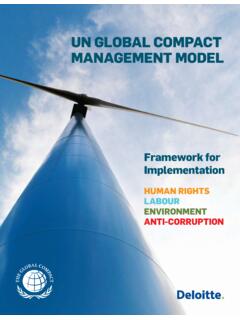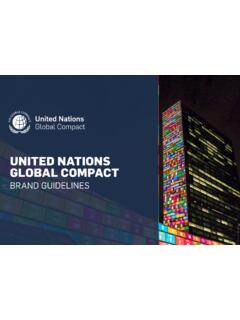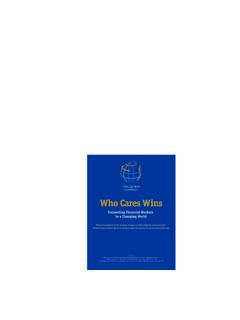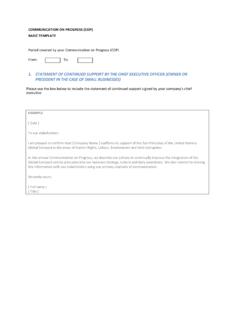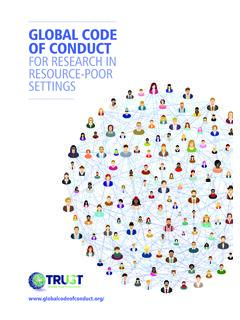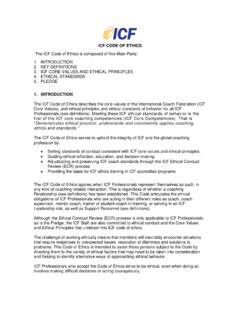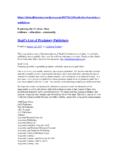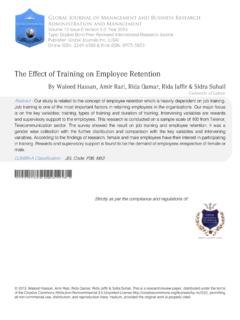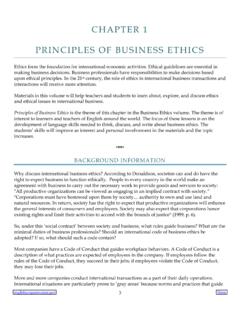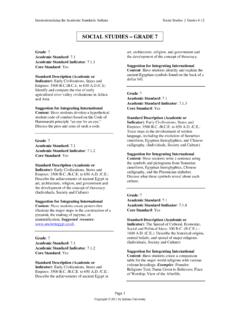Transcription of Supply Chain SuStainability - United Nations Global Compact
1 Supply Chain SuStainabilitya practical Guide for Continuous improvement Second Editionii Supply Chain SustainabilityThe United Nations Global Compact is a call to companies everywhere to voluntarily align their operations with ten universally accepted principles in the areas of human rights, labor, environment and anti-corruption, and to take action in support of United Nations goals and issues. The UN Global Compact is a leadership platform for the development, implementation and disclosure of responsible corporate practices and policies. Launched in 2000, it is the largest corporate SuStainability initiative in the world, with over 8,000 companies and 4,000 non-business signatories based in 160 works with its Global network of more than 250 member companies to build a just and sustainable world. From its offices in Asia, Europe and North and South America, BSR develops sustainable business strategies and solutions through consulting, research and cross-sector collaboration.
2 Visit for more information about BSR s more than 20 years of leadership in inclusion of company examples in this publication is intended strictly for learning purposes and does not constitute an endorsement of the individual companies. CopyrightThe material in this publication is UN Global Compact encourages the dissemination of the content for educational purposes. Content from this publication may be used freely without prior permission, provided that clear attribution is given to UN Global Compact and BSR and that content is not used for commercial purposes. 2015, UN Global Compact Office and BSRUN Global Compact revision project team: Anita Househam and Elena revision of this guide was also made possible thanks to the input of the UN Global Compact Advisory Group on Supply Chain SuStainability with special contribution from its ad hoc Task Force and the UN Global Compact original guide was written by Cody Sisco, Blythe Chorn and Peder Michael Pruzan-Jorgensen, with significant editorial input from Cecilie Hultmann, the UN Global Compact Office staff, BSR staff and the UN Global Compact Advisory Group members in 2010, also listed on Page 4.
3 Innovation Norway, Nokia and Ford offered their generous support for the development of this guidance in 2010. Designer of the revised guide: Tannaz Fassihi1 ContentsForeword 2 Georg Kell, Executive Director, UN Global Compact OfficeAron Cramer, President and CEO, BSR Executive Summary Practical Steps to Supply Chain SuStainability 51. Introduction 72. Getting Started on Supply Chain SuStainability 15 Developing the Business CaseUnderstanding the LandscapeEstablishing a Vision 3. Establishing SuStainability Expectations for the Supply Chain 23 Overview of Engaging Supply Chain Management ProfessionalsOverview of Supplier code of ConductAdopting or Writing a Supplier code of ConductUsing the Supplier code of Conduct4. Determining the Scope 29 Supply Chain MappingSupply Chain Prioritization5. Engaging with Suppliers 37 Selecting Communications ChannelsMonitoring and EvaluationRemediation and Capability BuildingEngaging with Sub-Tier Suppliers6.
4 Determining Roles & Responsibilities 51 Internal AlignmentGovernance and Oversight: Executive Leadership and the Board of DirectorsCross-functional Coordination among Business ManagersImplementation by Supply Chain Management Professionals7. Industry Collaboration & Multi-Stakeholder Partnerships 59 The Context for Industry Collaboration Opportunities and Risks of Industry Collaboration Multi-Stakeholder Partnerships8. Establishing Goals & Tracking and Communicating Performance 67 The Process of Goal SettingGoals for ImpactGoals for Supplier Performance Goals for Internal PerformanceMeasurement Processes and PracticesCommunicating Progress and ReportingAcknowledgements 722 Supply Chain SustainabilityForewordSince the original launch of Supply Chain SuStainability : A Practical Guide to Continu-ous Improvement in 2010, companies have continued to extend their commitment to responsible business practices to their value chains, from subsidiary to suppli-ers.
5 The business case for Supply Chain SuStainability has evolved significantly. An increasing amount of companies have realized the crucial importance of incorporating SuStainability requirements into their Supply Chain programme in order to secure their own brand value, manage legal, regulatory and reputational risks as well as foster product innovation and explore new markets. Moreover, businesses consider the many rewards Supply Chain SuStainability can deliver in terms of creating more inclusive markets and the contribution they can make to advance sustainable development in the spirit of the United Nations missions. As the UN is expected to adopt the Sustainable Development Goals, business has an enormous opportunity to step up and take a broader view of their role in society, explore how they can do more to support their suppliers on corporate SuStainability and use their value chains as a source of increasing their positive impact on people and the environment.
6 A large number of initiatives, standards and resources have been developed in the recent years to complement and/or build on the mission of the UN Global Compact . The Guiding Principles on Business and Human Rights, endorsed by the United Nations Human Rights Council in 2011, have provided further detail on the corporate responsibility to respect human rights, which is part of the UN Global Compact Principle 1 and how businesses can know and show that they are meeting it, both within their company and in the Supply Chain . In the mean-time, the UN Global Compact s Advisory Group on Supply Chain SuStainability , which was formed on the occasion of the original development of this guide in 2010, continues to maintain a leading role within the the UN Global Compact to support its overall strategy on this issue and contribute to the development of specific guidance on various second edition of Supply Chain SuStainability : A Practical Guide to Continuous Improvement, developed in collaboration with BSR and the UN Global Compact s Advisory Group on Supply Chain SuStainability , is aimed at reflecting the new and emerging trends in this area since its original launch in 2010 as well as ensuring the inclusion of and alignment with relevant standards and initiatives.
7 Featuring numerous updated and new examples of good corporate practice, the guide remains a valuable tool to provide companies with practical guidance on how to develop a sustainable Supply Chain programme based on the values and principles of the UN Global Compact and assists businesses in setting priorities for action that will lead to continuous performance improvement. We hope this publication will continue to further the work of companies in col-laborating with their suppliers to deliver tangible and lasting benefits to busi-ness, the environment and societies everywhere. Georg Kell Executive Director UN Global Compact3 Supply chains continue to be one of the most important levers for business to create positive impact in the world, with an estimated 80% of Global trade pass-ing through Supply chains. By working together, buyers and suppliers in Global Supply chains and networks can advance human rights including labor rights, climate resilience, environmental protection, inclusive economic growth and ethical business the original guide Supply Chain SuStainability : A Practical Guide for Continuous Improvement was launched in 2010, Supply Chain SuStainability has become main-stream for businesses and there have been significant promising developments.
8 The UN Guiding Principles on Business and Human Rights have clarified busi-ness responsibility for human rights in their own operations and Supply chains. We have seen advances in the way companies work with their suppliers, moving from focusing heavily on auditing towards using new technologies and collabora-tive efforts to engage suppliers and workers in a more equitable approach to find joint solutions. We have seen increasing levels of transparency from companies, publishing lists of factories, openly reporting on the social and environmental performance of their Supply chains and promoting transparency to their suppli-ers. We have also seen unprecedented amounts of collaboration among business-es and stakeholders in efforts to ensure that commodities, such as wood, cotton and fish, are traceable and sustainable. BSR continues to work with our Global network of 275 member companies and their Supply Chain partners around the world to develop, support and implement Supply Chain SuStainability towards a just and sustainable world.
9 We are proud to be a part of the launch of this revised guide on the fifteenth anniversary of the UN Global Compact Ten Principles. The original version of this guide has helped businesses of all sizes around the world to understand what Supply Chain SuStainability means and how to imple-ment practices in their own business, industry and geographic contexts. The revisions made in this updated version reflect the advancements in the field; reinforce the core practices that are accepted minimum standards; and underline the needed areas for improvement. We hope that this guide continues to make a significant contribution to advance fair and sustainable working conditions and environmental protection and per-formance for entire industries, geographies and market segments by: Extending SuStainability to small and medium-sized enterprises Creating better connections to firms in developing countries on key social and environmental issues Supporting good governance and business ethics as a key pillar of well-functioning is very proud to have partnered with the UN Global Compact and we look forward to continuing to support it and its business participants around the world to make the vision of the UN Global Compact an even more powerful CramerPresident and CEOBSR4 Supply Chain SustainabilityUnited Nations Global Compact Advisory Group on Supply Chain SustainabilityIn 2010, the UN Global Compact established an Advisory Group of UN Global Compact participants and stakehold-ers to guide its work on Supply Chain SuStainability .
10 The role of the Advisory Group is to provide input to the overall strategy and work done by the UN Global Compact on the issue of Supply Chain SuStainability and to ensure that the guidance material developed is robust and addresses the needs of business. In addition to this guide, the Advisory Group has set up task forces to develop various tools and resources aimed at helping businesses to integrate the UN Global Compact Ten Principles into Supply Chain relationships. The advisory group is chaired by Mr. Mads vlisen, Special Advisor to the Global Compact on Supply Chain sustain-ability and a former member of the UN Global Compact Board. We would like to thank Mr. vlisen and all of the members of the Advisory Group for their ongoing support to the Supply Chain SuStainability workstream and the re-vision of this resource (members with an asterisk * have been part of an internal Task Force devoted to the in-depth revision of this version of the guide): *Ms.
